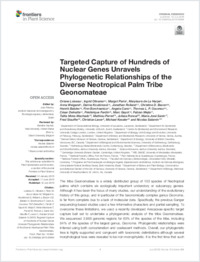Targeted Capture of Hundreds of Nuclear Genes Unravels Phylogenetic Relationships of the Diverse Neotropical Palm Tribe Geonomateae
- Loiseau, Oriane Department of Computational Biology, University of Lausanne, Switzerland
- Olivares, Ingrid Department for Systematic and Evolutionary Botany, University of Zurich, Switzerland - Centre for Biodiversity and Environment Research, University College London, United Kingdom
- Paris, Margot Department of Biology, Unit Ecology and Evolution, University of Fribourg, Switzerland
- Harpe, Marylaure de La Department of Botany and Biodiversity Research, University of Vienna, Austria
- Weigand, Anna Department for Systematic and Evolutionary Botany, University of Zurich, Switzerland
- Koubínová, Darina Department of Computational Biology, University of Lausanne, Switzerland - Natural History Museum of Geneva, Switzerland
- Rolland, Jonathan Department of Computational Biology, University of Lausanne, Switzerland - Department of Zoology, University of British Columbia, Vancouver, BC, Canada
- Bacon, Christine D. Department of Biological and Environmental Sciences, University of Gothenburg, Sweden - Gothenburg Global Biodiversity Centre, Gothenburg, Sweden
- Balslev, Henrik Department of Bioscience, Biodiversity and Ecoinformatics, Aarhus University, Denmark
- Borchsenius, Finn Science Museums, Aarhus University, Denmark
- Cano, Angela Cambridge University Botanic Garden, Cambridge, United Kingdom
- Couvreur, Thomas L. P. IRD, DIADE, University of Montpellier, France
- Delnatte, César National Forestry Office, Fort-de-France, France
- Fardin, Frédérique Parc National de la Guadeloupe, Guadeloupe, France
- Gayot, Marc National Forestry Office, Guadeloupe, France
- Mejía, Fabian Facultad de Ciencias y Biotecnología, Universidad CES, Medellin, Colombia
- Mota-Machado, Talita Programa de Pós-Graduação em Biologia Vegetal, Departamento de Botânica, Instituto de Ciências Biológicas, Universidade Federal de Minas Gerais, Belo Horizonte, Brazil
- Perret, Mathieu Department of Botany and Plant Biology, Conservatory and Botanical Garden of the City of Geneva, University of Geneva, Switzerland
- Roncal, Julissa Department of Biology, Memorial University of Newfoundland, St. John’s, NL, Canada
- Sanin, Maria José Facultad de Ciencias y Biotecnología, Universidad CES, Medellin, Colombia
- Stauffer, Fred Department of Botany and Plant Biology, Conservatory and Botanical Garden of the City of Geneva, University of Geneva, Switzerland
- Lexer, Christian Department of Botany and Biodiversity Research, University of Vienna, Austria
- Kessler, Michael Department for Systematic and Evolutionary Botany, University of Zurich, Switzerland
- Salamin, Nicolas Department of Computational Biology, University of Lausanne, Switzerland
- 12.07.2019
Published in:
- Frontiers in Plant Science. - 2019, vol. 10, p. 864
English
The tribe Geonomateae is a widely distributed group of 103 species of Neotropical palms which contains six ecologically important understory or subcanopy genera. Although it has been the focus of many studies, our understanding of the evolutionary history of this group, and in particular of the taxonomically complex genus Geonoma, is far from complete due to a lack of molecular data. Specifically, the previous Sanger sequencing-based studies used a few informative characters and partial sampling. To overcome these limitations, we used a recently developed Arecaceae-specific target capture bait set to undertake a phylogenomic analysis of the tribe Geonomateae. We sequenced 3,988 genomic regions for 85% of the species of the tribe, including 84% of the species of the largest genus, Geonoma. Phylogenetic relationships were inferred using both concatenation and coalescent methods. Overall, our phylogenetic tree is highly supported and congruent with taxonomic delimitations although several morphological taxa were revealed to be non-monophyletic. It is the first time that such a large genomic dataset is provided for an entire tribe within the Arecaceae. Our study lays the groundwork not only for detailed macro- and micro-evolutionary studies within the group, but also sets a workflow for understanding other species complexes across the tree of life.
- Faculty
- Faculté des sciences et de médecine
- Department
- Département de Biologie
- Language
-
- English
- Classification
- Biological sciences
- License
-
License undefined
- Identifiers
-
- RERO DOC 326946
- DOI 10.3389/fpls.2019.00864
- Persistent URL
- https://folia.unifr.ch/unifr/documents/308004
Statistics
Document views: 180
File downloads:
- pdf: 245
